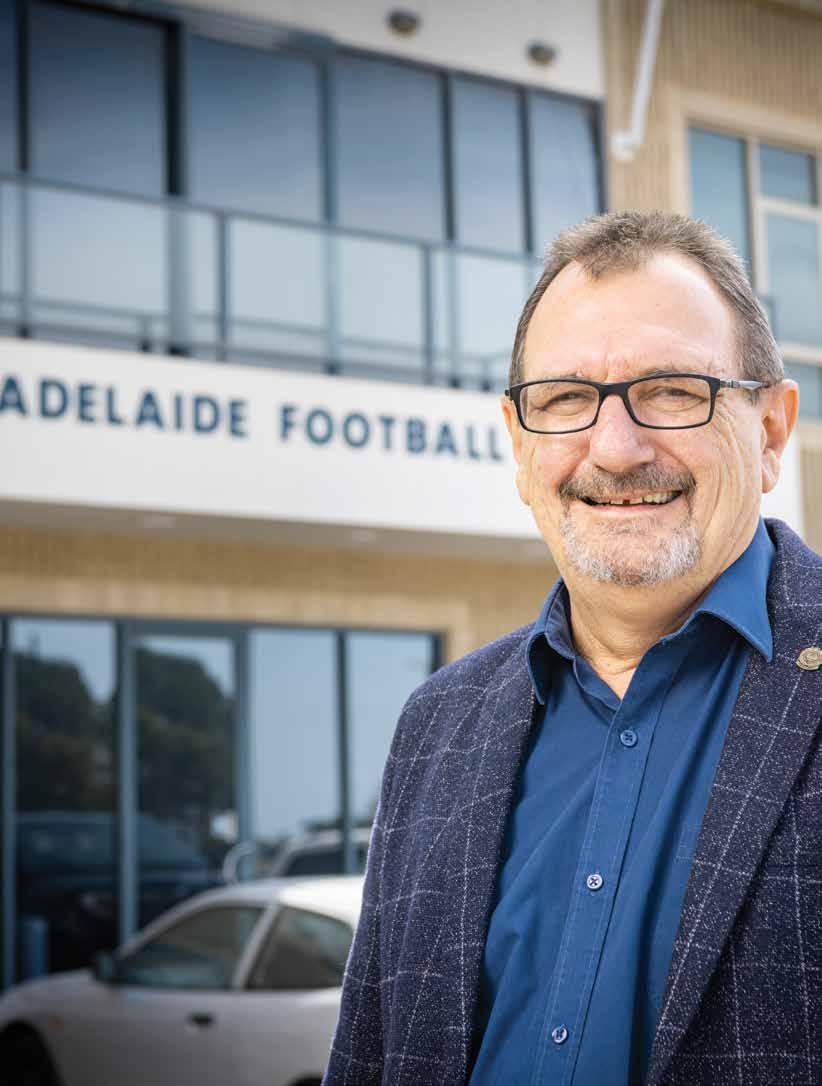
36 minute read
President
P
PRESIDENT
Mark Carroll
Big trouble in the CBD
The ongoing failure of the SAPOL district policing model to provide a permanent police presence in Hindley St continues to cause major issues.
SAPOL has indicated that it will provide this presence when its new CBD foot-patrol plan is developed.
In the meantime, however, both police and the public are placed at greater risk.
Members have described a recent situation in which all available patrols were required to deal with a single critical incident in the city — leaving no other police to respond to any other calls in the entire CBD.
Before the introduction of the district policing model, the CBD had 12 two-person patrols.
Now, there is a maximum of four patrols for the entire CBD and surrounding area.
Members have shared concerns about insufficient numbers of officers to prevent outright violence. The current setup clearly does not provide a safe environment for police or the public.
I have urged SAPOL to review this issue immediately. It must, as a matter of urgency, address the failure of the DPM as it relates to the CBD, and ensure the city is fully prepared to emerge from COVID-19 restrictions.
Anything less would put South Australians at risk. It must, as a matter of urgency, address the failure of the DPM as it relates to the CBD, and ensure the city is fully prepared to emerge from COVID-19 restrictions.
Eyre Western CIB
There are, sadly, similar issues on the Eyre Peninsula.
A general lack of numbers in Ceduna CIB and Family Violence Investigation Section is the major source of the issues.
In fact, SAPOL is requiring CIB members to be on call more frequently than seven days in 14, which is a direct contravention of the enterprise agreement.
This on-call requirement has resulted in Whyalla or Port Lincoln CIB covering Ceduna’s leave absences.
Some of these investigations are significant major indictable files, such as child sex offences, sexual assault and aggravated robbery.
The flow-on effects are real, too. General-duties patrol members in the area suffer, as CIB members are unable to assist them with investigations and searches.
Members from other locations hundreds of kilometres away — Port Lincoln and Whyalla — are often called on to address shortages in the area.
It is another area in which SAPOL must act, and quickly, to avoid the matter progressing beyond the current stage two of the industrial grievance and dispute avoidance procedure.
ICAC reforms
The Police Association strongly supported the new ICAC bill which MLC Frank Pangallo (SA-Best) recently introduced into the Legislative Council.
It is one of the most important pieces of legislation for police since the changes to the police discipline system.
The reforms stipulate that the ICAC would only investigate corruption, not misconduct or maladministration.
A host of other changes proposed in the legislation would strengthen public integrity institutions and align the ICAC more appropriately with its intended role and functions.
Ultimately, individuals summonsed to the ICAC over matters arising from their employment are at a disadvantage. The ICAC has significant public resources on which to draw, and a public servant is not likely to be able to fund his or her own legal representation.
The association has long had an interest in the proper functioning of the ICAC given that it has a significant impact on police.
For more than eight years we have received feedback from our members and our legal advisors, and we have assisted our members who have been subject to investigation. That has included welfare support.
We believe unequivocally that reform is necessary.
We have made detailed submissions at every inquiry into public integrity structures in SA. We also recently made a detailed submission to Premier Steven Marshall on why we believe the reforms put forward in the bill are critical.
The bill unanimously passed both houses of parliament.
Mandatory vaccinations
SAPOL has recently issued a direction to members indicating that it will be mandating COVID-19 vaccinations.
Current feedback indicates this direction will impact on a significant number of members who do not wish to have the vaccination.
The Police Association is on record as stating that it does not support the imposition of mandatory vaccination on its members.
We strongly believe in the right of each member to make his or her own decision.
We do, however, understand the need for members who voluntarily undertake specific COVID-related duties to receive vaccinations.
Of course, the association encourages its members to make their personal health decisions with the fullest possible knowledge and understanding of the relevant medical facts and implications.
To this end, we recently held an online information and discussion session for members who were still undecided about having the vaccination. The session featured a panel of medical experts and doctors, with members encouraged to ask them a wide range of questions.
In light of the recent SAPOL direction, the association has also called a meeting of delegates to discuss which options — legal or otherwise — will be available for members who do not wish to be vaccinated.
Clearly, some members hold strong views on either side of the mandatory vaccination argument.
Regardless of each member’s personal view, we have been presented with a situation in which potentially hundreds of members are facing a forced leave arrangement or, possibly, termination.
We have a duty, and a responsibility, to explore whatever options those members have within the existing legal frameworks.
The delegates meeting will be held in early November. We will keep members informed of any updates or developments on this issue.
If you have a specific enquiry about this issue, please email
pasa@pasa.asn.au.
The Crows’ own detective
It is hard to determine which of his two lives has been more intriguing, the personal or the professional. And now in another life, Detective Senior Sergeant 1C John Schulz (ret) is plying his skills for the Adelaide Crows.
By Brett Williams
round 50 cops stood and applauded John Schulz when he walked into the Mount Gambier police social club back in 1995. It was a rare form of peer acknowledgment and a first for the then undercover operative. But he had, after all, just ensnared a drug dealer with a $16,000 buy of 225 grams of amphetamine.
Schulz had kept up his drug-buyer façade for two months and, at one point, faced the closest call of his police career.
It happened in a Mount Gambier pub where he and his informer were waiting to meet up with the dealer. Another man, drinking in a corner of the bar, had fixed his gaze firmly on the waiting pair. Schulz noticed him staring and asked his informer: “What’s the go with this bloke?”
The informer confessed that he knew the starer, whose arm he had broken during some jail time he had spent with him. That, of course, had Schulz concerned but the staring man eventually left the pub, and it seemed a case of disaster avoided.
A little while later, however, he came back – with a handful of his mates. They surrounded Schulz and the informer at the bar, and each had a schooner glass in his hand.
Then, from one of the intimidators, came a question to unnerve Schulz even further: “Glass or blade?” He knew that meant an imminent attack on him and the informer with either the schooner glasses or knives.
Still, today, he remembers thinking: “I’m f--ked! I’m in real strife this time.” And that seemed a perfect summary of his predicament, until the 198cm barman swung into action. He jumped the bar and, as Schulz describes it, “pissed them (the aggressors) off”.
With the risk of a stabbing eliminated, Schulz got his meeting with the dealer who turned up at the pub late. The eventual drug buy went down in a local warehouse and the job ended with the arrest of the dealer. He wound up convicted and jailed.
The operation gave Schulz a “real taste” for covert policing, but not his first taste. That came after he had completed the detective
Atraining course and was back in uniform working Hindley St. He had gathered up all his files and set out on the walk from Bank St police station to the old Angas St headquarters. That was the home base of Adelaide CIB, which he was to join within the next day or two. But on the walk, in plain clothes, he wound up approached by a bloke who asked: “Hey, man, do want to buy some green?” Seizing on the opportunity, Schulz agreed to come back and buy an ounce for around $300. Meanwhile, he went to consult the Drug Squad, where he got the okay to make the buy. “So, I went down and did it,” he says. “And I’d actually had police files in my arms as he was asking me whether I wanted to buy this green. “That was my first taste of it (covert policing), and it sort of sparked my interest. ”


Indeed, Schulz would come to relish undercover jobs, like the investigation he and his Drug Squad colleagues undertook into Domenic Perre in 1995-96.
It all started after police had discovered two offenders cooking meth in a clan lab in the Adelaide Hills. And out of that discovery came an informer who knew NCA bombing suspect Perre.
That informer, along with two undercover officers from interstate, were to help Schulz and colleagues Pat McManus and Doug May get evidence of meth production against Perre and his accomplices.
“We got a UC (undercover) and controller from Victoria and another UC from New South Wales,” Schulz explains. “The UC from Victoria had actually been taught how to cook meth.
“He and Perre negotiated and eventually came up with the conspiracy to build a meth lab. So, the lab was all set up.
“We were supplying the chemicals and he (Perre) was supplying the money and the (Angle Vale) premises and some of the other equipment.
“The cook went ahead, and we did the raids early one morning and locked up everybody with two UCs.
“That was a great job. To get Perre on-site at a clan lab that he financed was quite a significant thing. He did a fair stretch for that. ”
or a bloke who, in his youth, had never had a burning desire to be a cop, Schulz was acquiring a lot of job satisfaction. It was perhaps compensation for a lot of bad luck in his childhood and later personal life.
After his parents split up when he was just seven, his father never again sought contact with him.
“He was a pretty abusive father, both to my mother and to me,” Schulz recalls. “I can remember being petrified when he came home, as to whether I’d get a belting or not. And I think he was probably an alcoholic. ”
Schulz and his younger brother went to live with their maternal grandfather in Kimba while their mother remained in Adelaide to study nursing.
She had completed her training and worked as a nurse years earlier. But in those days, the 1960s, former nurses had to undertake the three-year live-in course all over again.
“When I was over in Kimba, I really struggled with it,” Schulz says. “One, he (my father) had left, and two, my mother was gone a fair bit of the time. ”
During holidays was when mother and her sons got to spend time together. But after a couple of years had passed, and she had re-established herself, the three got to resume life as a family back in Adelaide.
“I look back now,” Schulz says, “and think how remarkable she was, and I probably didn’t realize it at the time. ”
Schulz had attended Kimba Area school before returning to Adelaide, where he continued his education at Highgate Primary and Unley High schools.
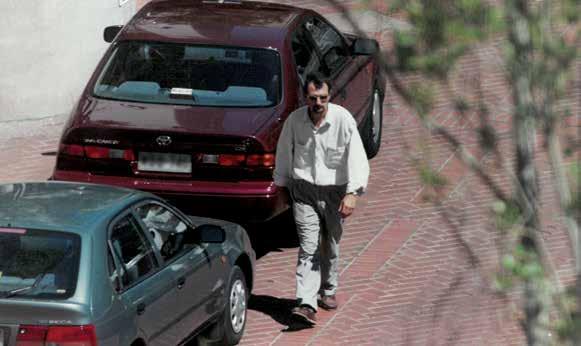
1 2
3
1. Schulz on an undercover operation in 1998. 2. During his undercover days in 1998. 3. About to undertake a drug buy at the Hyatt Hotel in 2001.
F
When the time came to think about job prospects, he spoke with his then stepfather who raised the idea of a police career. Then 16, Schulz had never considered law enforcement but knew a family friend who, at the time, was undertaking his academy training.
Word from the young man’s family was that he was “having a great time”.
“And, so, I applied and got in,” Schulz says. “It was a really quick decision. I started on February 5, 1976, and I’d just turned 17 two weeks earlier.
“For probably the first three months I really didn’t want to be there, but then, it just swept me up. ”
The only other job the young Schulz might have scored was with the Reserve Bank. He got an interview but ended up overlooked, which he came to see as a blessing.
Of course, few young recruits ever got through their training without an element of misadventure. Schulz had his moment while “skylarking” in a dormitory block.
He had jumped up to touch a light globe, but it smashed and some of its pieces wound up in his eye. It was a serious injury, but Schulz recovered and continued his training with Course 56.
Another memorable moment, while still a recruit, came at the funeral of his paternal grandmother. There, at the ceremony, was his remarried father, whom he had neither seen nor spoken to since his parents had split.
“He didn’t speak to me,” Schulz recalls. “I just found it unusual. He bought me a beer but didn’t come and talk to me.
“The last I knew he was up at Mount Isa. I’ve got no idea whether he’s dead or alive. I’ve just sort of wiped him. Bit annoyed. ”
Once through his recruit training, after two years and nine months plus three months as a reserve cadet, Schulz graduated in December 1978. Region B was his first post, where he worked as a patrol officer.
“In those days, we had the whole area out to Athelstone and down south to Darlington,” he says. “With the Traffic guys, there’d be 200 people on parade every morning. It was quite remarkable, and I had a lot of fun. ”
But the fun ended abruptly after Schulz went down in a motorcycle accident and broke his lower leg. To repair the damage, doctors inserted a plate which enabled Schulz to get back to work, but on crutches and in the non-operational role of Region B collator.
Around 12 months later, with the plate removed, he got back on the road and had no problem with his leg – for a while.
Long involved in local football, he fell over while coaching teenaged players in the parklands and rebroke his lower leg. With the “bone sticking out” it was clearly a shocking break.
It led to a couple of rounds of surgery, a battle with gangrene, and bone-growth stimulation treatment, which lasted for 15 months.
“And, at one stage,” Schulz says, “I thought I was going to lose my leg. I thought: ‘What am I going to do with my police career?’
“So, I made a decision to go teaching down at the academy. I was there for a bit over two years, until my leg got fully healed. ”

4. About to search a roof for a break-in. 5. As team manager for SA amateur footy side against Victoria.
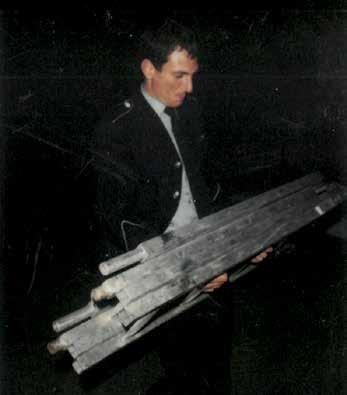
s he had undergone hospital treatment for that second break, Schulz met his then future wife, a nurse who hailed from Tasmania. She had come from a family of 16 children, among whom she was a middle child.
Her parents had produced 14 children but, after they divorced, her mother remarried and had two more. And the man who had become her mother’s second husband had nine children from his first marriage.
Ultimately, the couple ended up with an extended family of 25 children.
“So, I’d go down to Tasmania and there was still about nine or 10 kids living at home,” Schulz remembers. “I just couldn’t get over it. It was like living in an army barracks. ”
Still, Schulz married into the family at the age of 29.
Naturally, when his future parentsin-law came to Adelaide for the wedding, they met his mother and stepfather, who had retired to Normanville. The visitors found the seaside town so enchanting that they eventually bought a block of land there.
But that led to bad news for Schulz one evening when he arrived home from work. His parents-in-law were going to come to Adelaide to build on their block.
No problem with that. Until his wife told him that her parents, along with a heap of the children, would “live with us” as the construction took place.
Schulz exclaimed: “No they’re not!” But, after he arrived home from work one other evening, he found a caravan parked in his driveway. The family had lobbed.
With the disagreement unresolved, Schulz moved out of the family home. He returned but he and his wife separated and ultimately divorced.
“There were other issues (besides her family moving in),” Schulz says, “but that was the straw that broke the camel’s back. ”
When Schulz and his wife separated, she was pregnant. He only learned of the birth of his child when he got a phone call from his mother-in-law.
“I was working afternoon shift at Adelaide CIB when she rang,” he says. “She said: ‘You've had a daughter,’ and the phone went ‘clunk’. And that was it.
“My ex-wife then married her stepbrother and moved to Sydney. So, before my daughter was two, she’d moved to the eastern seaboard, so I’ve had a long-distance relationship with her. ”
Schulz found the dynamics of that relationship tough at the outset. He only got time with his daughter twice a year, during school holidays. And the sight of his two-year-old walking toward him across the Adelaide Airport tarmac, escorted by a flight attendant, broke his heart.
It was rare, however, for Schulz to get overly emotional in his work. His greater interest was always in dealing with offenders rather than victims.
Nonetheless, the plight of some victims did move him. In one case in the city around 1982, the driver in a car-crash wound up trapped in his seat. Schulz was the on-scene cop he reached out to, and whose hand he grabbed and held as he lay dying.
The incident had “a bit of an effect” on the then patrol officer, who was only around 23 years old.
Another job had some effect on him, too. It was a death message he had to give a young wife and mother.

AHer husband had died in a motorbike crash on Norton Summit Road.
“You just couldn’t do anything for this woman,” he says. “And I don’t think we were very good in those days at following up on how people were (coping). ”
Before he left Adelaide CIB for the Drug Squad, Schulz undertook one of his most memorable jobs with now Major Crime boss Des “Doc” Bray.
In 1993, a young woman had gone to visit her older married sister and not returned home to her parents. They tried calling their elder daughter but got no answer and so eventually called the police.
Schulz and Bray drove out to the older sister’s Holden Hill home after themselves getting no answer on the phone. The most they expected was a case of abduction.
Says Schulz: “We knocked on the door and the (husband answers and) says: ‘Oh, I’ve killed my wife. ’
“He’d raped the sister in front of his wife and left her (the younger sister) tied up in the shed out the back. He then killed his wife and buried her in the backyard in a very shallow grave.
“He made full and frank admissions. Still don’t know why he did it. ”
6. Preparing court files at Adelaide CIB in 1990. 7. On the CIB designation course in 1991 (front row second from right). 8. Receiving the APM from Governor Kevin Scarce in 2009 for his commitment to the investigation of organized crime throughout Australia.
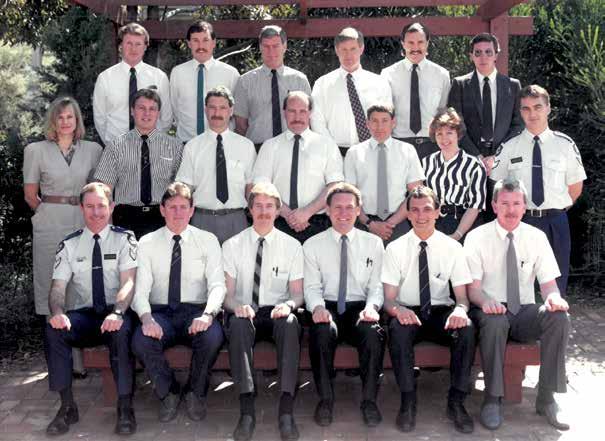
8 ater came the work Schulz relished in specialist areas like the Drug Squad, which he joined in 1994. He had undertaken the relevant two-week course, with its one session on undercover work.
New members to the squad were to have six months’ experience before they attempted any drug buys.
“Undercover work just enthralled me,” Schulz says, “and I didn’t last the full six months before I started doing it.
“For my first undercover drug buy I bought from a bloke we used to call The Businessman. He would walk around with a briefcase with all these drugs in it. ”
After his start, buying heroin from The Businessman, Schulz continued with undercover work until 2002, when he transferred to Port Adelaide CIB. He calculates that, before then, he had applied for detective-sergeant positions 23 times – and now he had one.
“So, I went down to the Port and loved it,” he says. “I hadn’t been in mainstream CIB in eight years and things had changed a lot in that time.
“I had a really good young team, and I was amazed at the level of investigation these kids were doing. It was so much higher than what I’d done as a young detective. ” In 2006, as OC of the Viking Joint Task Force, Schulz got to work on Operation Confound. The objective of the operation was to bring down a syndicate of international drug traffickers importing heroin into Australia. On the case, in partnership with the Australian Crime Commission, was Customs, the Australian Federal Police, and cops from SA, WA, NSW and Victoria. The investigators knew that Vietnamese-born Australian drug couriers were bringing the heroin in from Vietnam. Their challenge was to identify them, among hundreds of other travellers, and establish how they were concealing the heroin. The initial thought was that the couriers were sewing the drugs into L their clothes. But, as the investigation went on, it looked like they were sewing them into their suitcases. As the investigators drew toward a big win, they determined that a courier was flying into Perth, so Schulz and his colleagues flew over there, too. “Two of the organized crime syndicate had driven to Perth so we knew it was on,” he says. “We thought we knew who the courier was, a woman, and we got seven kilos in her two suitcases. “I remember conducting a briefing in the Sydney office of the ACC. I had about 400 coppers ready to go the next morning, so the pressure was on. “We ended up locking up 18 people Australia-wide and they got a total of 180 years in head sentences over 20 years. “The main crook had gone to Melbourne, but we got him extradited. ” So, there was Schulz, a detective from Adelaide in Sydney with an offender extradited from Melbourne for an offence that occurred in Perth. Explaining that to the Sydney City Watch House sergeant was a tough exercise.
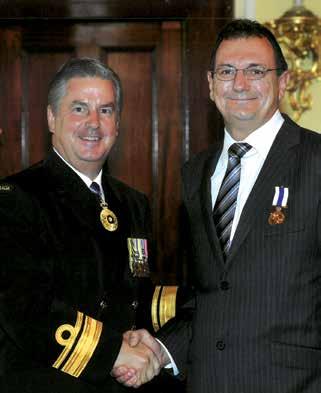
n mid-2019, as Schulz drew close to retirement, he applied for and scored the job of integrity and security officer for the Adelaide Football Club. And his appointment made sense. He was a highly experienced detective, had 40-odd years’ involvement in amateur footy, and had long supported the Crows.
But it was a time of upheaval. Controversy had beset the club after its 2017 grand final loss to Richmond and the Dunstall-Pavlich post-season review was soon to take place.
Schulz, in his new role, was to manage compliance audits, which included player contracts, the club salary cap, and all AFL rules.
But he would also spend time with the players as he did last year during segregated training sessions forced on them because of COVID-19.
“I was doing something like an operation order every day for training,” he says. “That’s because there were so many rules and regulations the AFL had in place.
“The players were only allowed to train in small groups. I had them going to the gym at different times, and on the oval at different times. It was really difficult, and then we spent two weeks up on the Gold Coast in a hub. ”
Schulz accompanies the players on occasions like mad Monday. He also talks to them about criminal associations and drug use, and the scope for reputational damage to themselves, the club and the entire footy industry.
After an incident occurs – as it did on a plane last May when players wore masks incorrectly – Schulz investigates it and prepares a report for the AFC board.
Even enquiries into the controversial 2018 Gold Coast training camp, which happened before his appointment, have demanded his input.
“I had to send SafeWork SA those training plans that I do,” he says, “and copies of the presentations I’ve given the players about criminal associations and drugs. That’s all finalized now. ”
Among those Schulz reports to is the club deputy chair, Police Association member and SAPOL assistant commissioner Linda Fellows.
It is a kind of reversal of roles given that, during his time at the police academy 30-odd years ago, he had taught Fellows as a cadet. And, later, the two worked together at the Drug Task Force.
But it is the players who interest Schulz the most. He speaks of them as “good young people” whose lives are not “all beer and skittles”.
“Everyone thinks about the big money they get,” he says. “But, of the kids who come into the system, I think about 50 per cent of them are gone within five years.
“Starting wages are less than a probationary constable on shift work, and they’ve got this window of opportunity of maybe 10 years. ”
“It’s really interesting to see these kids develop from 18-year-olds. You’re starting to see it with players like Jordan Butts, Ned McHenry and Harry Schoenberg.
“It’s also sad when you see some that don’t make it. What are they going to do?”
But Schulz enjoys plenty of laughs, too, particularly with players like 29-year-old midfielder Paul Seedsman. He describes him as an “absolute card” and a lover of TV cop shows.

I
“So, he’ll be watching a cop show at 11 o’clock at night,” Schulz explains, “and he’ll ring me and say: ‘Schulzy, do you know about this one?’ ”
Just as some older players move from multi- to single-year contracts, so too has Schulz at age 62. He had always expected to work to the age of 65, so he might yet remain in the role for three more years.
After he does retire from paid work, he intends to stay involved with his local footy club and travel around the northern half of Australia. The only regret with which he retired from policing last month was that he never served in the country.
And he figures that, had he pursued and attained commissioned rank, he would never have had the all the good times he enjoyed.
Of his days in undercover work, he still says: “I loved it. ” PJ
Schulz at Adelaide Football Club headquarters.
After taking part in the interview for this story, John Schulz visited Queensland where he discovered that his father had died in 2019. And, having found out some years ago that he has a half-sister, he discovered on his visit to Queensland that he has a second, younger half-sister.
BIG SAVINGS! Police Association Members’ Buying Guide Facebook Group

The Police Association has created a new Facebook group to advise you more effectively and efficiently of savings and special offers for you and your family. This is a closed group for members only.
See the full list of offers on the Members’ Buying Guide on PASAweb (pasa.asn.au) or the Police Association app.
By joining the group, you will be the first to know about seasonal and exclusive specials, specifically designed to save you money.
POLICE ASSOCIATION OFSOUTH AUSTRALIA
POLICE ASSOCIATION OF SOUTH AUSTRALIA
Police Association Annual Conference


Left to right: Police Association president Mark Carroll, Premier Steven Marshall, Opposition leader Peter Malinauskas and Police Commissioner Grant Stevens.

Police Association Annual Conference

The COVID burden on police certainly came up at the Police Association annual conference. But so too did the high demand for cops to respond to mental-health incidents. Premier Steven Marshall and Opposition leader Peter Malinauskas joined association delegates and had their say.
By Nicholas Damiani
Staffing issues still overwhelming cops
Staffing issues across many areas of SAPOL continue to pose issues for members, according to Police Association president Mark Carroll.
Mr Carroll, in his address to association delegates and the media, said the events of the last 18 months continue to have an “overwhelming” impact on police officers. ”It’s regrettable that COVID-19 is still the major news topic of the day,” he said.
“Many members have spent extended periods away from their families, ended in up quarantine, had leave cancelled, put their own life commitments on hold, and suffered both physically and psychologically.
“At times, more police were on duty in medi-hotels than in some police districts.
“Our position has been that some COVID duties are simply not roles for sworn police officers. ”
Mr Carroll said the association had outlined several practical solutions to SAPOL and the government over the last 20 months of the pandemic.
“These include increased recruitment, and the recruitment of recently retired or resigned officers, incentive payments and the recruitment of protective security officers,” he said.
“The PSOs were an obvious solution. ”
He acknowledged that the government and Commissioner Grant Stevens ultimately responded and implemented some of the solutions but said the association would have preferred to see the outcome sooner.
Mr Carroll explained that staffing issues all across SAPOL — some unrelated to COVID duties — were causing a serious strain on members and affecting the delivery of services to the community.
“We have spoken to the commissioner about areas such as Southern District Response, the district policing teams, Riverland CIB, Hindley St patrols and the broader Eastern District,” he said.
“A long-running industrial dispute about staffing issues on Kangaroo Island also remains in progress. ”
Police duties unlike any other
SA police officers have led the nation when it comes to community support and positive feedback during the COVID-19 pandemic, according to Premier Steven Marshall.
Mr Marshall told delegates this year’s nationwide report on government services revealed Police Association members had been the pacesetters for the entire nation.
“(You) are the highest-ranking police in the nation for community satisfaction and community perception of professionalism,” he said.
The premier said that, although nobody could have predicted the events of the last two years, SA cops had calmly risen to every challenge thrown at them.
“More than 350 police members on average, each day, have dedicated themselves (to COVID duties),” he said.
“The duties these members have performed have been unlike any other policing duty.
“I’m quite certain that no police members, as they were undertaking their training as cadets, would have envisaged their duties as members to include guarding our borders, processing crossborder applications and ensuring compliance with pandemic restrictions. ”
Premier Marshall said the relationship between the Police Association and the state government was as strong as ever.
“PASA has delivered strong outcomes over the last three-anda-half years,” he acknowledged.
“We have worked through COVID issues. In total, we’ve provided more than $100 million in additional funding and resources to support SAPOL’s response to the pandemic.
“This includes accelerating the recruitment of an additional 72 cadets and 168 protective security officers. ”
The premier also highlighted the current rollout of custom-made stab- and bullet-proof vests, and the new assaults-on-police legislation, as two more examples of the association’s strong collaborative approach with government.
“(This legislation) has seen the strongest penalties this state has ever had in place for assaults against police and emergencyservices workers,” he said.
“They send a clear message to those who think they can get away with committing violent acts against some of the most respected members of our community. ”
The premier said the vests had already been rolled out to 2,600 officers.
Mental-health incidents demand too much of police
SA must urgently invest in its “broken” health system or face ongoing issues with police resources, according to state Opposition leader Peter Malinauskas.
Mr Malinauskas told delegates the percentage of police resources used to respond to mental-health episodes was too high.
“Being a police officer is more difficult today than it has ever been before, and I’m not just talking about COVID,” he said.
“It is a lot to ask men and women to protect the public from dangerous criminals, at the same time they do the jobs of social workers, psychologists and psychiatrists.
“Cutting crime means preventing crime, but none of it is achievable without the right level of resources. ”
Mr Malinauskas also announced he was backing the Police Association call to compel people to undergo a blood test if they spit on — or bite — police officers and other emergency-services workers.
He said the general number of assaults against police officers was still a major concern, with over 660 people charged with assaulting police since the beginning of the pandemic.
The former SDA secretary also praised the conference delegates for their strong union representation.
“Being a delegate is a thankless task,” he said.
“Your day job is to be in harm’s way but, as a delegate, you take on additional responsibilities to look after your fellow workers, sometimes putting you in harm’s way of your superior officer.
“That takes a degree of courage and sacrifice. ”
Mr Malinauskas promised funding for stab-proof vests — over and above the commitment already made by the Marshall government.
The government is currently rolling out 2,900 vests, but the Opposition leader has promised a further 1,500 if he is elected premier, ensuring more members will be protected.
The commitment, supported by the Police Association, is worth an extra $4.5 million.
DPM 2 still to be trialled
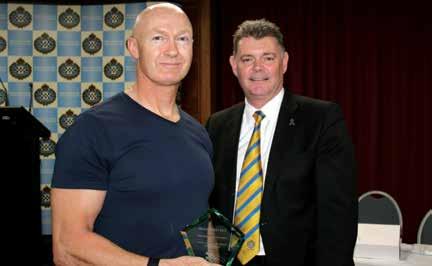
The second phase of the SAPOL district policing model has not been properly trialled owing to COVID-19 staffing issues, according to Commissioner Grant Stevens.
The commissioner told conference delegates the model is still yet to be tested under normal working conditions.
“We launched DPM two in late March 2020,” he said. “DPM two has not be trialled — that’s the reality.
“My hope is that we’re able to push as many people out of COVID-19 duties back into the districts as soon as possible, so that we can commence the model as it’s supposed to look.
“We believe it’s a sound model, but it has to be tested. If we need to make changes, we will make changes. ”
Commissioner Stevens said the COVID burden was likely to be lifted in 2022, at which point he was hopeful the newly acquired protective security officers would transition into substantive ongoing roles.
He also said the current regional review was uncovering issues that require “the ongoing attention of a part of the executive”.
“We’re already under pressure (even) in the outer metro area,” he said. “The Barossa and Hills Fleurieu areas, are seeing phenomenal growth. ”
The commissioner also told delegates he was optimistic about the rollout of SAPOL’s new Mobile Workforce Transformation programme.
“This means we’re rolling out (smart devices) to every employee, with full access to systems, and for personal use,” he said.
“It’s not just about saving 30 minutes of a patrol officer’s time every day.
“What the programme really means to me is putting information into the hands of every SA police employee, so you have direct access wherever you are, whatever you’re doing. ”
Members can expect the rollout of devices to gather momentum within the next 12 months, Commissioner Stevens said.
He also discussed the direction which requires all SAPOL employees to provide notification of their COVID-19 vaccination status by October 24, but stressed the jabs were not mandatory.
“It’s essential for us to have an appreciation of how many are not vaccinated and potentially where they are,” he said.
“We haven’t made a determination about mandatory vaccinations.
“(But) one of the factors that would influence our thinking is just how many of the workforce are not vaccinated.
“The absence of that information will probably cause an alternative decision that we might not ordinarily make if we had all of the information at our disposal. ”
Eastern District Response sergeant Tim Tollenaar has won the 2021 Police Association Step Up Award for workplace safety.
Sgt Tollenaar submitted a hazard and incident report on January 17, 2021.
The report highlighted the district policing model’s impact on response and team structure within the Eastern District, including issues such as: • Response staffing before and after the implementation of the DPM. • The area of responsibility extended from Hindley St to suburban areas. • Hindley St foot patrols not being part of the DPM structure. (A lack of operational presence had resulted in increases in victimreported crime and decreases in the policing of licenced venues.) • District policing teams were unable to address occurrences or had insufficient staff to respond to taskings. • Workload intensification. • The current policing model was unsafe for response members and the community in general.
Sgt Tollenaar continued to represent the workplace and provide information to the association about his district policing model concerns, particularly in respect of: • Staffing and rostering at
Eastern District. • Enterprise bargaining. • The lack of workplace consultative committee meetings and OHSW meetings. • Police station design.
The association then wrote to Commissioner Grant Stevens on January 25, 2021, highlighting its concerns about the ongoing failure to facilitate a permanent police presence in Hindley St and surrounding areas.
President Mark Carroll also fronted the media to address the public about the association’s concerns surrounding member and community safety.
On February 3, 2021, Commissioner Stevens wrote to the association highlighting that he had requested the assistant commissioner, Metropolitan Operations Service, to provide a permanent foot patrol in the area.
Association assistant secretary Steve Whetton told delegates that “Sergeant Tollenaar’s actions demonstrated exceptional professionalism and reflect the association Strategic Plan 2017-2022” .
Award for highlighting shortfall in DPM
Sergeant Tim Tollenaar receives the Step Up Award from Police Association president Mark Carroll.


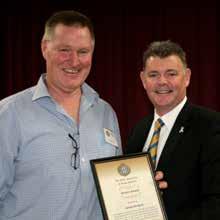
1 2


3 4 5
Influential delegate an award-winner
Detective Brevet Sergeant Scott Milich won the Police Association Biennial Delegate of the Year Award.
Assistant Secretary Steve Whetton told delegates there had been many examples of Detective Brevet Sergeant Milich’s influence as a delegate, including: • Seeking and explaining award conditions to his and other workgroups. • Assisting members with administrative grievance processes. • Roster-change compliance with the award. • COVID implications and changes conducted in the workplace. • Commissioner of Public Employment guidelines. • Explaining the historical aspects of current conditions of employment. • Explaining the enterprise bargaining process and new clauses. • Equipment concerns and
WorkCover considerations. • Meeting with association staff while on programmed leave. • Superannuation contributions. • Assisting with the provision of hazard and incident reports. • Arranging statements from members to enable industrial action. • Attendance at Crime Command
Branch meetings.
Assistant Secretary Whetton told delegates the actions Detective Brevet Sergeant Milich undertook were “overwhelming evidence of the advocacy and assistance he has provided in his role as a workplace delegate”.
Service awards
Police Association president Mark Carroll presents service awards to: 1. Senior Constable 1C Andrew Bradley (five years) 2. Detective Brevet Sergeant Alex Grimaldi (five years) 3. Superintendent Les Buckley (five years) 4. Police Association vice-president Daryl Mundy (10 years) 5. Police Association committee member Chris Walkley (10 years)
Police Association service awards for five years continuous service went to Senior Constable 1C Andrew Bradley (Metro South Branch), Detective Brevet Sergeant Alex Grimaldi (Crime Command Branch) and Superintendent Les Buckley (Officers Branch).
For 10 years’ service, awards went to Police Association vice-president Daryl Mundy and committee member Chris Walkley. PJ
Morning break, day 1
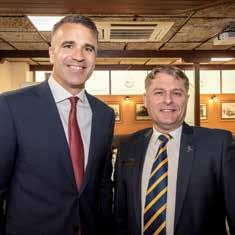
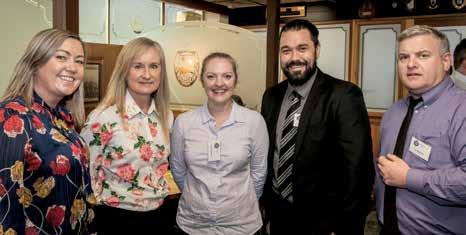
6



7 8




9

6. Leonie Schulz, Samanda Brain, Vilija Sabeckis, Sam Agostino and Ian Mitchell 7. Kerry Rouse and Mel Smith 8. Stephen Foenander and Les Buckley 9. Darren Quirk, Matthew McCarthy and Matt Sampson 10. Police Association assistant secretary Steve Whetton and Gavin Mildrum 11. Josh O’Dwyer and Nathan Paskett 12. Duncan Gerrie and Bryan Whitehorn 13. Opposition leader Peter Malinauskas and Police Association treasurer Michael Kent 14. Commissioner Grant Stevens and Premier Steven Marshall 15. Paul Velthuizen and Dick Hern 10
11
12



